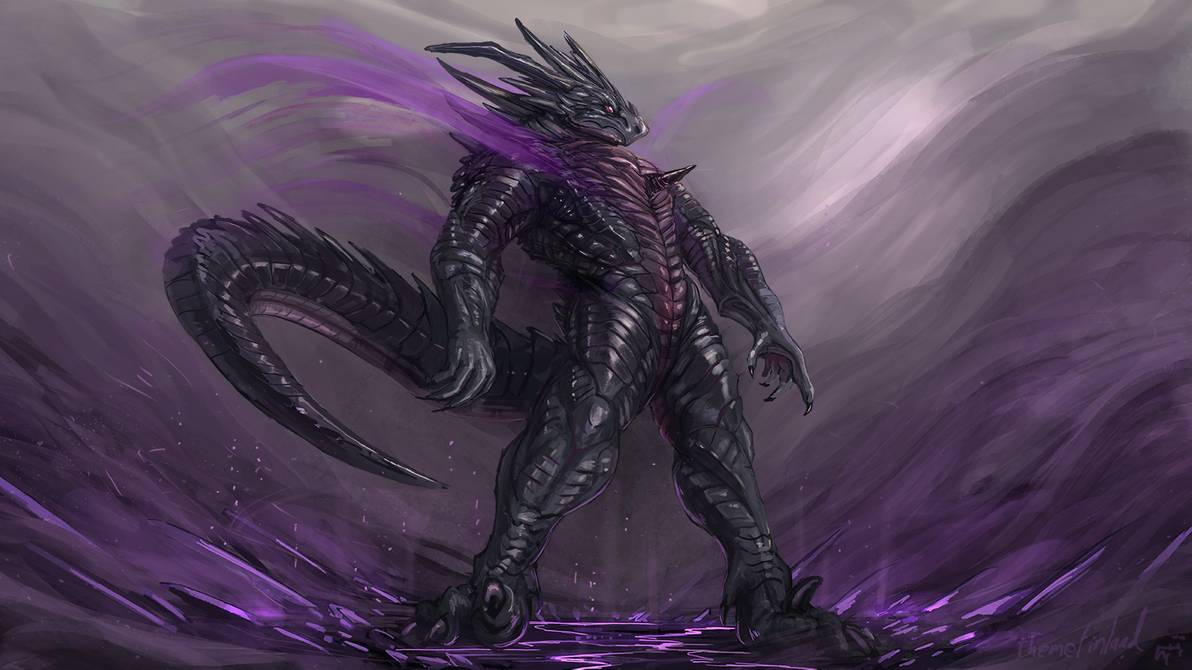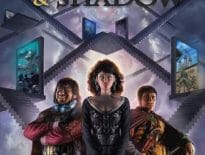Scion is a tabletop RPG from Onyx Path Publishing set in a modern world like ours except gods are real. There are thousands of them, and while they generally prefer to stay in the background rather than take direct action, they don’t hide, and the whole world knows about them. The supernatural is real, even if it’s not commonplace, and myths and legends of those pantheons are real too. Even the ones that contradict each other.

The core rules are found in Scion: Origin. Origin is the book that introduces The World and the Storypath system. Onyx Path first announced three other books; Hero, Demigod and God. Each one represents a power level up from the one before. You might start the game as a Scion as they become a Hero and begin to build their own Legend. If you’re successful that Hero might become a Demigod and even a God.
At least, I think that’s how it works. Danielle Lauzon is the first-named author on Scion: Origin, so she’ll know, and we’re lucky enough to have secured some of her time for a quick Q&A. It’s an exciting time for the young RPG as Onyx Path has announced two more books for the series. Scion: Dragon, for which Danielle Lauzon, is the lead developer and Scion: Masks of the Mythos.
Geek Native has added some creative commons dragon art to this interview from Deviant Art. These images are lovely eye candy and not necessarily reflective of what you might find in Scion: Dragon.
Danielle’s answers are based on the first version of the manuscript and so details may significantly change between now and release.
In my intro, I say that characters in Scion could start out as heroes freshly equipped with the knowledge they have a divine connection and work their way up to being full gods. Is that right?
Yes. Scion characters become Heroes when their divine patron first visits them (Visitation) and essentially unlocks their capabilities. The more you do in service to the divine, the more you build your Legend. The higher your Legend is, the more power you have access to. Think of it like earning money in the form of fame and recognition for your deeds. You can play characters as pre-Visitation Scions, as they are still Scions, but they don’t yet have a Legend. You are pretty limited, but it’s a fun way to run your characters through their Visitation stories.
Can heroes now also become dragons?
No. Dragons are separate entities who exist alongside the pantheons (and sometimes within) and they give birth to their own children, or pick their own Scions just like Gods do. These characters are called Heirs. Heirs start out as normal seeming people, and a Dragon bequeaths (Bequeathal) an inheritance upon them regardless if they want that thing. Then the Heir has to decide if they are going to accept that inheritance or reject it to remain human. The more they do in service of their draconic ancestor, the more they become a Dragon. Either way, once you are an Heir, you have a cool dragon form you can turn into to go full Dragon. A fun tidbit about being an Heir is that the stories about Dragons are often told from the perspective of the Gods and not from the Dragons themselves. So knowledge about the true nature of Dragons, who they are, what they are doing, etc. is sketchy at best. As an Heir, you unlock these secrets as you play the game, defining your ancestry as you go, which is a bit of a reverse of Heroes who follow an inevitable Fate. Another fun tidbit is that your Dragon ancestor doesn’t have to be alive to tap you into service, instead you could be a reincarnation of a dead dragon who has a series of motivations and goals they set out for you before they ever even died.

What sort of new Pantheons might we see in Scion: Dragon, if any?
You won’t see any new pantheons in Scion: Dragon. Instead, you’ll see the Dragon groupings, called Flights. Flights are loosely based on two things, physical characteristics of the Dragon (such as how many legs, does it have wings, etc.) and the physical space in the World that they inhabit (Asian, South American, European, etc.). These Flights are awkward groupings of entities and we explain why that happened. Dragons once ruled the World, then humanity and their Gods came along and decided that they wanted the World to themselves, and started killing Dragons and their followers (a people Dragons claim exist before humanity). So the Dragons went into hiding, and formed Flights out of necessity to survive. These groupings happened fast, and without a lot of care and consideration, so groups who aren’t necessarily happy about being grouped together share a Flight. We made this choice so that Dragon could exist as a self-contained book. If we tried to do specific cultural groupings of Dragons we’d end up with dozens of Flights with different names and slightly different stories, but in many cases a lot of the same features and characteristics. And we just don’t have room for that.
Dragons seem both like a marvellous choice for Scion but also a particularly awkward one. I mean, aren’t Chinese dragons like the Dragon Kings essentially gods? Others might just be Titan or legendary creatures. How are you or any Storyguide going to fit such iconic entities into the game?
Based on the idea that Dragons went into hiding, it works really well. Some Dragons joined the pantheons as Gods or Titans as a means for survival. In Scion, Gods sometimes have mantles, other faces or personas who are just as much them as anything else, but function fully separately. These Dragon/Gods are mantles of one another. They are Dragons who became Gods (or Titans) and now live in service to their pantheon. Some have turned their backs on dragonkind completely and others are double agents working both for their Pantheon and their Flight. And just like with any other Scion game, you can decide how much of that you want to include or not include. A lot of Dragon stories are embroiled in Pantheon stories, the Gods are the ones who attacked them and sent them into hiding after all. Dragons are outside the normal struggle between Gods and their Titans, and instead form a kind of intermediary group who wants both sides to die in a fire. But that means they work both sides, acting as middle men, arms dealers, and agents hoping that the Gods and Titans will just blow each other up and leave the World to Dragons. So if you want to include a Dragon mastermind in your Hero game, I don’t see it being much different than adding in a Titan who acts as an antagonist to the characters.
As for running a game of Dragon, well, the Dragons themselves are secretive. They pull the strings from the background and lead their Heirs on a merry chase. Many Heirs might not meet their draconic ancestor in any form other than their dreams and memories for a long while. So again, you can include as much or as little Dragon (even in your Dragon game) as you want.
Should Scion stories mix divine characters with Dragons or isn’t that recommended?
A Scion story could mix divine and draconic characters, but I wouldn’t recommend it. Heirs function in a different capacity than Heroes. Where a Hero is on a journey to create a legend for themselves as they are embroiled in the Fate that drives their story forward, an Heir is embroiled in a secret society and must decide if they want to learn secrets and delve deeper, or reject it’s draw. While Heroes and Heirs will certainly encounter one another, and can act as antagonists or allies in each other’s stories, I wouldn’t recommend running a game with both Heroes and Heirs as player characters.

I think back to the early years of the World of Darkness and how some storytellers felt the need to add werewolves to their Vampire game after Werewolf came out, then Mages, then Changelings. In some cases, it didn’t feel like Vampire any more, even if started off that way. Is this a bad thing? Is this an issue you think Scion might wrestle with?
I think we’ve come a long way from the early days of games having various iterations where people thought they needed to include everything. I think Storyguides may be tempted to include Dragon narratives in their Hero games, and I don’t think it will derail the game much if at all. But Dragon is a separate game, and so it isn’t telling you that you should include Dragons in your normal Scion game.
While setting up this interview, you mentioned something about Dragons being a bit like super-spies. That caught both my attention and my imagination. Are you able to elaborate?
I have kind of discussed it a bit, but Dragons are in hiding. But that doesn’t mean that they are not acting. Dragons are few and far between as many Dragons died, and the group is in diaspora. They are attempting to amass power, but know that they can never go directly against the Pantheons, as they would be crushed under the combined might. This means that they prefer to keep a low profile and act in secret trying to work both sides of the equation. Their goals are many and varied, generally boiling down to “undermine the pantheons” but that’s rather simplistic. They don’t tell their Heirs what their ultimate goals are, and maybe only share what the Heir needs to know to get a job done. They use their Heirs as agents, giving them missions that seem unrelated which all lead to executing an elaborate plan. And Heirs decide if they want to work on that mission, or rebuke it.
You might be wondering, if an Heir might never meet their Dragon, and the Dragons are so secretive, how do they give Heirs missions? Well, how does espionage work? They arrange go-betweens, dead drops, P.O. boxes, etc. But Dragons also have something supernatural helping them, which is a deep collective memory that they all share. And if you are an Heir, you have access to this collective memory. So a Dragon may send a dream to their Heir, or the Heir may simply remember a set of instructions the Dragon left for them years in advance. This collective memory also allows Dragons who are now dead to enact their will on an Heir.
Are Dragons caught up with the tides of Fate in the same way Gods are? What’s to prevent them from taking a more direct role in the affairs of humanity?
Dragons don’t experience Fate the way Gods do. Fate does touch them, but only lightly and they can shrug it off pretty easily. Nothing prevents them from taking a direct role in the affairs of humanity, but that doesn’t mean that this is easy. Dragons are far more involved with humanity than Gods are, but they must keep a low profile. If the Gods realize that Dragons are meddling, they aren’t likely to let that stand. Not only that, but humanity knows little to nothing of Dragons, and therefore any actions Dragons take dealing with humanity must be done in such a way as to not scare them, or reveal too much truth about dragonkind. Remember, they are in hiding, so a giant dragon sighting in Cairo is going to throw the whole hiding thing out the window.

Any updates on when we can expect to see Scion: Dragon hitting Kickstarter?
Unfortunately, Onyx Path doesn’t set dates for stuff like that in stone. There are other projects in the pipeline to go to Kickstarter before this, and often we slot things in “when they’re ready,” so I can’t give you an answer here.
I’ve a Storypath newbie question that I’m sure you can nail for me. It’s about Complications; these are the “Yes, but…” complexities that affect successful challenges. Scion: Origin gives the example of barbwire on top of a fence. Does that mean the Storyguide will tell a player in advance that they need to, for example, beat Difficulty 2 to get over the fence and a level-1 Complication for the barbwire? The player responds by first putting together a dice roll for the fence climb and then, only if they’re successful, roll again for the Complication?
Okay, so the way that would work is this: You have a Difficulty 2 to climb and a +1 Complication that if you don’t buy off you might leave traces of you on the barbwire you’re crossing or maybe you take an Injury. You roll once, and tally up successes. Two beats the difficulty, you are over the fence. Great job! If you have a left-over success, you can use it to buy off the Complication. If you don’t buy off that Complication, then maybe you tear your pants and leave evidence of your crossing, or take a (-1) Injury Condition of Scratched. Either way, you roll once and success gets you over the fence, regardless of what happened with the Complication.
Think of successes in Storypath as an expendable resource. You roll to get the resource, and then spend those resources on things like beating the Difficulty, buying off Complications, and doing cool Stunts.
Creative Commons credit: Dragon form by Theme Finland, Eldergleam Dragon in the night sky 2 by skyrimphotographer and Chinese dragon by Ekaterina.
Thank you to Danielle! Geek Native plans to bring news of the Scion: Dragon Kickstarter when it goes live. Are you a Scion player? What are the highlights of the game or do you have any questions you wish we should have asked Danielle.


